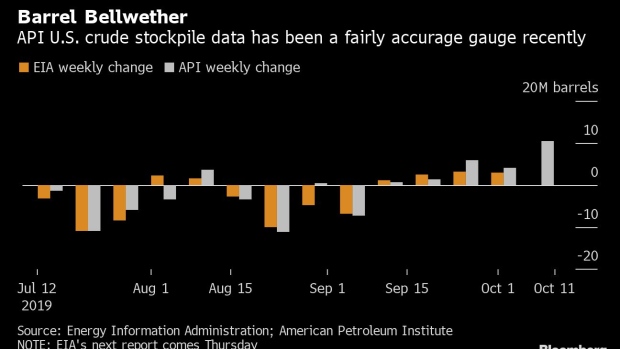Oct 17, 2019
Oil Drops as Industry Report Shows Big Jump in U.S. Stockpiles
, Bloomberg News

(Bloomberg) -- Oil fell after an industry report showed a sharp jump in U.S. inventories, adding to concern that supply keeps growing as demand ebbs.
Futures in New York dropped as much as 1.1% after closing up 1% on Wednesday. The American Petroleum Institute reported crude inventories rose by 10.5 million barrels last week, according to people familiar with the data. That would be the biggest increase since February 2017 if confirmed by the official Energy Information Administration figures due Thursday.
The Organization of Petroleum Exporting Countries faces a “serious challenge” to defend oil prices next year as fuel-demand growth could slow further amid a wave of new supply from the U.S., Brazil and the North Sea, the International Energy Agency warned on Wednesday. Progress toward a limited U.S.-China trade deal, while positive, isn’t likely to have a major impact on global economic growth unless existing tariffs are rolled back.
See also: Oil Market’s Big Data Show OPEC+ Will Have to Cut Output Again
The best-case scenario on U.S.-China trade would be a truce and no further tariff increases, Daniel Hynes and Soni Kumari, commodity strategists at ANZ Banking Group Ltd., said in a note. There’s also still a high chance of more supply disruptions in the Middle East, they said.
West Texas Intermediate for November delivery dropped 55 cents, or 1%, to $52.81 a barrel on the New York Mercantile Exchange as of 7:24 a.m. in London. The contract added 55 cents on Wednesday, its first gain in three days.
Brent crude for December settlement fell 54 cents, or 0.9%, to $58.88 on the London-based ICE Futures Europe Exchange. The global benchmark crude traded at a premium of $5.94 to WTI for the same month.
If the EIA data also shows an increase in U.S. stockpiles that would be the fifth straight weekly gain, the longest run since February. American inventories probably rose by 3 million barrels last week, according to the median estimate in a Bloomberg survey.
--With assistance from James Thornhill and Dan Murtaugh.
To contact the reporter on this story: Elizabeth Low in Singapore at elow39@bloomberg.net
To contact the editors responsible for this story: Serene Cheong at scheong20@bloomberg.net, Andrew Janes
©2019 Bloomberg L.P.


